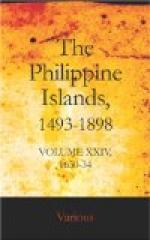During these years, the Dutch enemy did not discontinue coming to the coasts of Manila, where they robbed the Chinese and did all the harm possible. They tried to capture the ships carrying aid [from Mexico], so that without war they were growing rich, and disabling the people of Manila. In this emergency the pilots carried sealed orders, which they were to open on the return voyage and learn the port where they had to go, thus defeating the designs of the Dutch enemy, and freeing themselves from the secret spies who were in Manila—who, as it was said, were not lacking. Consequently, in many years no company [of religious] entered Manila directly, so that whatever missionaries the ships carried were scattered, and, not reaching Manila, no benefit was derived from them. Father Fray Alonso del Rincon [54] was coming from Espana with a fine company of religious. He reached the port of Acapulco, where that year the flagship from these islands did not arrive. After it left Manila and rounded the shoals, it had been wrecked near Verde Island, for the tides drove it upon some reefs. The almiranta passed on, and immediately another despatch followed it which the governor made, when advised of the event. In the latter the pilot and commander was the overseer Gaspar Nunez. This boat sailed September 16, and our Lord was pleased to let it arrive, but both vessels were very small. The governor of Terrenate, Pedro de Heredia, was coming. At last a vessel happened to arrive from Peru, and was immediately laden. Our religious embarked in it, as also did the fathers of the Society. Although the other two small boats had sailed a fortnight before, this vessel overtook them, and all entered the port of Casiguran, opposite Manila, about the same time. This small boat bore religious of our father St. Francis, and all the vessels suffered from a plague that was like to finish them. All the Franciscans died, although only one of Ours died, father Fray Nicolas Goyas, a Viscayan by birth, of the province of Castilla. He was an excellent Latin scholar, a fine poet, a very good theologian, and an eloquent preacher—all qualities useful here. But if the Lord chose to take him, who doubts that it was fitting?
The rest recovered and reached the said port on June 25, of the year 1622. There are many convents belonging to our father St. Francis in that district, and they assisted generously the needs of all, and especially of the religious, who were in need of everything. But for Ours, while going to Manila, the route which they took overland was so dangerous and so full of difficulties that daily they braved death a thousand times at the passage of the rivers. For the rainy season was at its height, and consequently the rivers were swollen outside their beds, and had very swift currents. They came afoot and shoeless, for the mud unshod them in two steps. Their food was morisqueta. [55] They suffered so great need of all things, although




